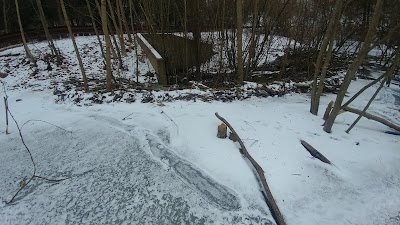Boehm Pond finally froze up enough to walk after a cold snap last week, so on Sunday I took a stroll through the flooded trees and explored the beaver pond. The surface looked like it had previously been thin and punky and coated with slush before the deep freeze. There were dozens of what looked like old breathing holes in the ice (now mostly frozen over) and plenty of interesting tracks.
Otter slide marks
Otter on the ice! Beaver lodge is in the background.
Then I looked back at those weird tracks on the ice I'd forgotten about and discovered they were otter slide marks. Otter were playing on the slushy ice. The sliding tracks were all over the place.
 |
| Otter slide marks crisscross the ice (click photo to enlarge) |
Otter are well-known for their play, which includes sliding on ice and snow. Often they take a few bounds and then slide, bound and slide, bound and slide. Here's a video of one doing that. They can also slide on their chest using their two back feet to push, or their two front feet to pull. Both types of slides can be seen in the above photo. They must have loved the slick layer of slushy snow on the ice.
Otter are not common in Shelton but are occasionally seen in Southwest Connecticut. My hunch is that they swam up the Far Mill River to Isinglass Reservoir from the Housatonic River, and then went overland or followed Boehm Brook to the pond. Otter eat fish, and I noticed a dead sunfish at the dam a few days later. There were no marks on it. It's possible that water quality issues in the shallow pond under the ice weakened some fish and made them easy prey, or even toys to play with (otter do not normally eat dead fish, but will sometimes kill extra fish for no reason except they think it's fun).
 |
| Otter slide at the beaver dam (box culvert goes under Winthrop Woods Road) |
 |
| Otter tracks, including tail drag |
Otter tracks are variable, but one version is four foot prints in a short line, almost on top of each other, with tail drag marks like the photo above.
Sounds of the beaver lodge:
babies and gnawing, lots of gnawing
babies and gnawing, lots of gnawing
Back to the beaver. Walking up to the lodge and crunching loudly on the ice pack with my ice spikes, I heard lots of gnawing from inside. This was surprising considering how noisy I was. They didn't care. The gnawing was a sharp contrast to the quiet, ice-covered pond. I started take a video of the gnawing, then took a few steps closer, at which point babies -- adorable babies! -- starting mewing. Be sure to turn up the volume if you watch the video. Many people think they sound almost human. If you want to imagine what it looked like inside the den, check out this other video taken inside a lodge of a couple baby beaver fighting about a stick.
 |
| Blowdowns at the back of the pond, and more otter slides |
At the back of the beaver pond, deep in the trees, there were quite a few uprooted trees, and many of these had formed protective water caves where the water was unfrozen. Otter tracks could be seen where they slid across the ices from one blowdown to another. They must have had a great time swimming around under the ice and then sliding across the top of it.
The uprooted trees also created islands where beaver had stockpiled sticks. Later in the week, after a big snow, I returned and there were no tracks in the back of the pond except for one uprooted tree where the beaver seem to have been exiting the water, climbing up the root ball, and pooping. There didn't seem to be any other activity in this spot, no chewing or anything, just pooping. Makes sense for them to keep this out of the iced-up pond.





